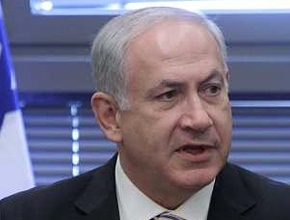|
World Jewish News

Photo by Emil Salman (Haaretz.com)
|
Netanyahu doubts Mideast peace deal possible by 2012
12.07.2010 Prime Minister Benjamin Netanyahu said Sunday that he did not envision a negotiated Middle East peace settlement within the next two years, despite his Palestinian counterpart's declared intentions to set up infrastructure for a state by 2011.
Palestinian Prime Minister Salam Fayyad has set a goal of building the institutions of a Palestinian state within a year. He has also said Palestinians could declare statehood unilaterally if the diplomatic deadlock continues.
Asked in an interview on U.S. television if there can be a Palestinian state by 2012, Netanyahu said: "I think there can be a solution. It may be implemented over time, because time is an important factor of getting the solution, both in terms of security arrangements and other things that would be difficult if they're not allowed to take place over time."
"Can we have a negotiated peace? Yes. Can it be implemented by 2012? I think it's going to take longer than that," he told Fox News on Sunday.
Netanyahu met U.S. President Barack Obama at the White House last Tuesday and both leaders said they hoped face-to-face Israeli-Palestinian negotiations would begin soon.
Israel and the Palestinians are currently negotiating indirectly through Obama's special Middle East envoy, George Mitchell. Netanyahu promised publicly in Washington to take "concrete steps" within weeks to persuade the Palestinians to upgrade the peace talks.
The prime minister said Sunday that he would travel to Egypt this week for talks on the matter with President Hosni Mubarak. During the interview with Fox, Netanyahu called Iran "the ultimate terrorist threat today", telling U.S. television it was a mistake to think Tehran's nuclear ambitions could be contained.
Netanyahu told his interviewer that Iran was "just moving on with its efforts" to develop nuclear weapons - a prospect he called "very, very dangerous."
Asked whether he thought a nuclear Iran could be contained, he said: "No, I don't. I think that's a mistake, and I think people fall into a misconception."
"I don't think you can rely on Iran," Netanyahu said in a taped interview. "And we should not allow irrational regimes like Iran to have nuclear weapons. It's the ultimate terrorist threat today."
Netanyahu declined to say whether he had any deadline for allowing diplomacy with Iran to run its course.
"We always reserve the right to defend ourselves," he said, reiterating a core policy of Israel, which does not confirm or deny widely held beliefs that it has the only nuclear arsenal in the Middle East.
Iran says its nuclear program is for peaceful purposes only. But the United States and its allies fear Tehran is pursuing an atomic weapons program and have pushed a series of United Nations and unilateral sanctions against Iran.
"There's only been one time that Iran actually stopped the program and that was when it feared U.S. military action," Netanyahu said.
"So when the president [Obama] says that he's determined to prevent Iran from developing nuclear weapons and that all options are on the table, I think that's the right statement of policy."
Netanyahu did not directly answer a question about a nuclear weapons-free zone in the Middle East but accused Iran, Iraq and Libya of violating a non-proliferation pact.
"So I think we should stay focused on the real problem in the Middle East," he said. "It's not Israel. It's these dictatorships that are developing nuclear weapons with the specific goal of wiping Israel away."
Haaretz.com
|
|
